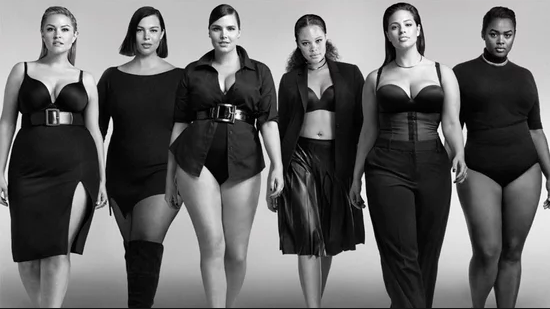With Eating Disorder Awareness Week starting off the month, it’s only fitting to close it with a celebration of the movement that’s taking the fashion world by storm – the Body Positive Movement, encouraging people to love their bodies despite their perceived flaws, with the aim of improving self – esteem and confidence. But in a society where the media constantly portrays the image of a ‘perfect’ body, how is the fashion industry broadening its boundaries and embracing body positivity?
Recently, clothing retailer Missguided has been making headlines with their inclusive and diverse range of mannequins, featuring stretch marks, freckles, vitiligo and various ethnicities. The brand is aiming to show the diversity of humanity, in a society where differences are viewed as imperfections.

This hugely positive change comes just a few months after the company announced it was halting the use of Photoshop editing on its models in ad campaigns; something that is a huge step forward within the fashion industry where almost everything we see is edited. Because we are used to seeing edited images of models with tiny waists and flawless skin, these changes will be incredibly positive in encouraging body positivity and boosting self-esteem as the consumers of the brand will be able to see themselves within the more diverse style of advertising. It’s proven that the perfect images we’re shown by the media every day are playing a huge role in young people developing negative values with regards to body image. It’s vital that young people are encouraged to feel positive in their own skin.
High street store Primark have also been making some positive changes, introducing their new ‘curve model’ Birmingham girl Sonny Turner. Finding fame through her incredibly relatable Instagram account, the model prides herself on being an influencer that fans can see themselves in, saying that ‘After scrolling through accounts of perfectly photoshopped, enhanced, edited and posed accounts you can come to mine and get some realness.’ (Sonny Turner for Elle)
As inspiring as it is to see these big labels making a positive step towards body positivity, Missguided have received some negative backlash in response to their inclusive campaign, regarding the lack of diversity in the size of their models. People have commented on the fact that, even though diversity is being shown through skin tone and other variables, they still portray the slim figures that we’re made to aim for. In most clothing lines, the ‘plus size range’ starts at a size 12-14, while the average size for women in the UK is a size 16 – what message is this sending to young people about the way their bodies are viewed?
The changes that have already been implemented are most certainly promising, yet there’s still a long way to go to diversify the fashion world to create an industry that everyone can feel comfortable in.
Hazel Kaye
Image: Popsugar

